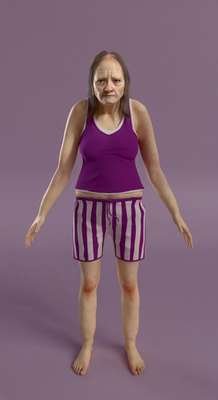What happens to your body when you get less than 6 hours of sleep? 'Worst-case scenario' revealed
By
Maan
- Replies 4
The future of our health may be more fragile than we think, especially when it comes to something as simple as getting enough sleep.
What started as a minor concern about our modern, sleep-deprived lifestyles has now evolved into a pressing issue with far-reaching consequences.
As experts predict, the effects of chronic sleep deprivation could drastically change how we look and feel by 2050.
A startling digital model of a woman named Hannah was created to showcase the terrifying effects of sleep deprivation on the human body. Designed by Bensons for Beds in collaboration with sleep expert Dr Sophie Bostock, Hannah serves as a visual warning of what could happen if we don't prioritise sleep.
This 45-year-old version of Hannah, from the year 2050, is the result of chronic sleep deprivation, where six hours or less of sleep per night has taken a severe toll on her health.
Hannah suffers from thinning hair, sagging skin, chronic back pain, swollen legs, and dark, baggy eyes. Her body has also endured muscle atrophy, meaning her arms and legs have lost muscle mass, making her more prone to illness due to a weakened immune system.
With modern lifestyles and an obsession with smartphones leading to late nights, people have never been more sleep-deprived. By 2050, experts predict a wide array of chronic health issues, such as those experienced by Hannah, could become commonplace.
Sleep experts recommend that adults aim for seven to nine hours of sleep each night, as those who sleep less than seven hours are at an increased risk of health problems. Research reveals that the average Brit only gets around six hours and 20 minutes of sleep each night.
Dr Bostock explained, ‘Hannah is a thought-provoking illustration of the holistic impact that sleep has on maintaining overall health.’ According to the expert, irregular sleep patterns and insufficient sleep disrupt our circadian rhythms, which regulate our physiology.
Fortunately, research has increasingly focused on the importance of good quality, consistent sleep, showing that prolonged sleep deficiency can contribute to serious health risks, such as heart disease, obesity, and Type 2 diabetes.
Hannah’s condition is based on 19 academic papers exploring the effects of sleep loss. These studies suggest that sleep deprivation contributes to a multitude of health issues.
Chronic Effects of Sleep Deprivation
Hannah, despite being only 20 when she began her sleep deprivation journey, now shows the physical toll of her poor sleep habits. As time passed, Hannah has developed various health issues, including hair loss (alopecia), muscle loss, and an increased risk of illness.
Her disrupted sleep also affected critical hormones that control hunger and fullness, such as leptin and ghrelin. Without enough sleep, leptin levels decrease, making it harder for the body to maintain its normal weight, while ghrelin levels rise, causing increased hunger.
Sleep deprivation also has a detrimental effect on memory. During sleep, the brain forms connections that help consolidate new memories. Hannah’s lack of sleep has hindered her ability to retain both short-term and long-term memories due to less time spent in these vital sleep stages.
Baggy Skin, Swollen Legs, and Back Pain
In addition to memory loss, Hannah’s skin has suffered. The lack of sleep has reduced collagen production, contributing to sagging skin and dark circles around her eyes. A reduction in collagen and the increased secretion of cortisol, the ‘stress hormone,’ makes the skin less elastic.
Chronic sleep deprivation also causes swollen legs and ankles. The stress hormone cortisol, which increases due to sleep deprivation, has been linked to heart disease, which leads to fluid retention and swelling in the lower extremities. As a result, Hannah’s heart has been prematurely affected, significantly reducing her life expectancy.
Back pain is another byproduct of inadequate sleep. The growth hormones released during deep sleep are essential for healing, but without them, Hannah’s back and shoulder pain have become chronic. This pain also prevents her from sleeping, creating a vicious cycle of pain and sleeplessness.
How to Avoid Hannah’s Fate
While Hannah’s condition may sound extreme, it highlights the very real consequences of poor sleep habits. So, how can you avoid ending up like her by 2050?
The key is getting seven to nine hours of sleep each night, as recommended by experts. Also, keeping a consistent sleep schedule by waking up at the same time each day (even on weekends) will help keep your circadian rhythms in check.
It's also important to seek out natural light during the day, as exposure to sunlight helps regulate sleep-wake cycles. Regular exercise—at least 150 minutes of moderate activity or 75 minutes of vigorous exercise per week—is essential for maintaining good sleep and overall health.
Moreover, avoid using electronic devices at least 30 minutes before bed, as the blue light emitted from screens can disrupt your ability to fall asleep. Finally, ensure your mattress is comfortable and provides adequate support for a restful night.
Lisa Richards, marketing director at Bensons for Beds, stated, ‘Hannah is a worst-case scenario prediction of what could happen to somebody if they do everything badly in terms of poor sleep routine and poor mattress support.’
‘Of course, she doesn’t represent all Brits, but the reason we wanted to create this model was to make people think more carefully about their overall sleep experience.’
By focusing on improving sleep habits now, we can avoid the grim future that Hannah represents.

If the effects of sleep deprivation are as drastic as predicted, what changes will you make in your own routine? Let us know in the comments.
What started as a minor concern about our modern, sleep-deprived lifestyles has now evolved into a pressing issue with far-reaching consequences.
As experts predict, the effects of chronic sleep deprivation could drastically change how we look and feel by 2050.
A startling digital model of a woman named Hannah was created to showcase the terrifying effects of sleep deprivation on the human body. Designed by Bensons for Beds in collaboration with sleep expert Dr Sophie Bostock, Hannah serves as a visual warning of what could happen if we don't prioritise sleep.
This 45-year-old version of Hannah, from the year 2050, is the result of chronic sleep deprivation, where six hours or less of sleep per night has taken a severe toll on her health.
Hannah suffers from thinning hair, sagging skin, chronic back pain, swollen legs, and dark, baggy eyes. Her body has also endured muscle atrophy, meaning her arms and legs have lost muscle mass, making her more prone to illness due to a weakened immune system.
With modern lifestyles and an obsession with smartphones leading to late nights, people have never been more sleep-deprived. By 2050, experts predict a wide array of chronic health issues, such as those experienced by Hannah, could become commonplace.
Sleep experts recommend that adults aim for seven to nine hours of sleep each night, as those who sleep less than seven hours are at an increased risk of health problems. Research reveals that the average Brit only gets around six hours and 20 minutes of sleep each night.
Dr Bostock explained, ‘Hannah is a thought-provoking illustration of the holistic impact that sleep has on maintaining overall health.’ According to the expert, irregular sleep patterns and insufficient sleep disrupt our circadian rhythms, which regulate our physiology.
Fortunately, research has increasingly focused on the importance of good quality, consistent sleep, showing that prolonged sleep deficiency can contribute to serious health risks, such as heart disease, obesity, and Type 2 diabetes.
Hannah’s condition is based on 19 academic papers exploring the effects of sleep loss. These studies suggest that sleep deprivation contributes to a multitude of health issues.
Chronic Effects of Sleep Deprivation
Hannah, despite being only 20 when she began her sleep deprivation journey, now shows the physical toll of her poor sleep habits. As time passed, Hannah has developed various health issues, including hair loss (alopecia), muscle loss, and an increased risk of illness.
Her disrupted sleep also affected critical hormones that control hunger and fullness, such as leptin and ghrelin. Without enough sleep, leptin levels decrease, making it harder for the body to maintain its normal weight, while ghrelin levels rise, causing increased hunger.
Sleep deprivation also has a detrimental effect on memory. During sleep, the brain forms connections that help consolidate new memories. Hannah’s lack of sleep has hindered her ability to retain both short-term and long-term memories due to less time spent in these vital sleep stages.
Baggy Skin, Swollen Legs, and Back Pain
In addition to memory loss, Hannah’s skin has suffered. The lack of sleep has reduced collagen production, contributing to sagging skin and dark circles around her eyes. A reduction in collagen and the increased secretion of cortisol, the ‘stress hormone,’ makes the skin less elastic.
Chronic sleep deprivation also causes swollen legs and ankles. The stress hormone cortisol, which increases due to sleep deprivation, has been linked to heart disease, which leads to fluid retention and swelling in the lower extremities. As a result, Hannah’s heart has been prematurely affected, significantly reducing her life expectancy.
Back pain is another byproduct of inadequate sleep. The growth hormones released during deep sleep are essential for healing, but without them, Hannah’s back and shoulder pain have become chronic. This pain also prevents her from sleeping, creating a vicious cycle of pain and sleeplessness.
How to Avoid Hannah’s Fate
While Hannah’s condition may sound extreme, it highlights the very real consequences of poor sleep habits. So, how can you avoid ending up like her by 2050?
The key is getting seven to nine hours of sleep each night, as recommended by experts. Also, keeping a consistent sleep schedule by waking up at the same time each day (even on weekends) will help keep your circadian rhythms in check.
It's also important to seek out natural light during the day, as exposure to sunlight helps regulate sleep-wake cycles. Regular exercise—at least 150 minutes of moderate activity or 75 minutes of vigorous exercise per week—is essential for maintaining good sleep and overall health.
Moreover, avoid using electronic devices at least 30 minutes before bed, as the blue light emitted from screens can disrupt your ability to fall asleep. Finally, ensure your mattress is comfortable and provides adequate support for a restful night.
Lisa Richards, marketing director at Bensons for Beds, stated, ‘Hannah is a worst-case scenario prediction of what could happen to somebody if they do everything badly in terms of poor sleep routine and poor mattress support.’
‘Of course, she doesn’t represent all Brits, but the reason we wanted to create this model was to make people think more carefully about their overall sleep experience.’
By focusing on improving sleep habits now, we can avoid the grim future that Hannah represents.
Key Takeaways
- A digital model named ‘Hannah’ reveals the severe effects of sleep deprivation on health, showing chronic pain, hair loss, and muscle atrophy.
- Hannah’s condition is the result of getting just six hours of sleep per night, causing long-term damage like weakened immune function and memory loss.
- Sleep deprivation also leads to skin aging, swollen legs, and chronic back pain due to hormone imbalances and reduced collagen production.
- Experts recommend 7-9 hours of sleep per night, with tips to improve sleep including regular schedules, exercise, and avoiding screens before bed.
If the effects of sleep deprivation are as drastic as predicted, what changes will you make in your own routine? Let us know in the comments.








